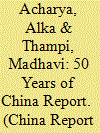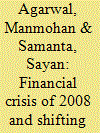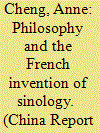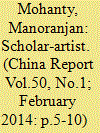|
|
|
Sort Order |
|
|
|
Items / Page
|
|
|
|
|
|
|
| Srl | Item |
| 1 |
ID:
129052


|
|
|
|
|
| Publication |
2014.
|
| Summary/Abstract |
With this issue, China Report commences its fiftieth year of publication. It seems a good time to look back over our long journey, to take stock, and also to look ahead at what our goals and priorities would be in the coming years. The China Report began its 'long march' in December 1964 as a bi-monthly, through the joint efforts of Giri Deshingkar and CRM Rao. Giri had just returned to India after completing a Bachelor of Arts in Chinese from the School of Oriental and African Studies, London, while CRM Rao, who had left a job in the corporate sector to commence work with the Radical Humanist, a journal started by the late M.N. Roy, was closely associated with a group of scholars in the Centre for the Study of Developing Societies, Delhi. It cost all of `1/- to buy a copy of China Report in those days, and for the princely sum of `5/- one could avail six copies annually
|
|
|
|
|
|
|
|
|
|
|
|
|
|
|
|
| 2 |
ID:
129057


|
|
|
|
|
| Publication |
2014.
|
| Summary/Abstract |
This article analyses shifts in economic power over the last five decades or so. While developing countries (DCs) and regions have increased their share of incremental world income and incremental world exports over this period, there is very little shift in the relative rankings according to size of GDP of the 25 largest economies in 2011. The economies of South Korea and Brazil have become relatively much larger; the other changes have been minor. The correlations between the ranks over the years are very large showing that there has been little change in the rankings. Also, the GDP and per capita GDP of other countries and regions have increased relative to the US but this increase has been slow, particularly after 1982. The GDP of most of the large DCs has increased relative to that of the US but far fewer have increased their relative per capita GDP suggesting slow rates of growth of productivity and limited structural change of shift in economic activity from low productivity to high productivity sectors. Aggregating 20 indicators to form an index of economic power, we find that there has been little change in the rankings according to this index. Further, measuring the distance of individual countries from the US on the basis of these indicators, we find that most countries have been converging on the US, but very slowly. There is no evidence that the 2008 financial crisis has resulted in a hastening of the decline of the US.
|
|
|
|
|
|
|
|
|
|
|
|
|
|
|
|
| 3 |
ID:
129059


|
|
|
|
|
| Publication |
2014.
|
| Summary/Abstract |
The 'ecosystem' of Chinese enterprises is greatly affected by the external environment. This article proposes a behaviour-based internal control framework, defined as '3 + 1', which includes controls at the decision-making, management and operational, as well as behavioural levels. Considering the characteristic Chinese social institution, economic development pattern, policies and regulation, as well as individual values and other external factors, the purpose of this article is to provide new insight and methods to solve fundamental internal control issues by constructing an appropriate institution that can balance internal and external factors to solve both the short- and long-term problems of the control of Chinese Enterprises.
|
|
|
|
|
|
|
|
|
|
|
|
|
|
|
|
| 4 |
ID:
129054


|
|
|
|
|
| Publication |
2014.
|
| Summary/Abstract |
At a time when Chinese intellectuals and academics are more and more interested in the way Westerners, especially sinologists, approach and study Chinese culture, it seems relevant to pause and reflect on the critical and diversified approaches contributed by European sinologies. Special attention should be paid more particularly to the French tradition, which was the very first to be set up in the early nineteenth century within various prestigious academic institutions that are still very much alive today, but which has been somewhat pushed to the background by the powerful thrust of American, and more generally Anglophone, sinology ever since the aftermath of the Second World War. This article proposes to look at the way the French invention of sinology in the nineteenth century was under the influence of the concomitant rise of philosophy as a specifically European academic discipline.
|
|
|
|
|
|
|
|
|
|
|
|
|
|
|
|
| 5 |
ID:
129053


|
|
|
|
|
| Publication |
2014.
|
| Summary/Abstract |
When Govind Purushottam Deshpande (1938-2013)-famously known as GPD- passed away on 16 October, the news spread shock waves in three worlds-the Marathi cultural world, the world of Indian theatre and the world of China Studies, besides the many civil liberty and democratic rights circles in different parts of India, all of whom are united not only in their grief at the irreparable loss, but also in the celebration of his life. We at the Institute of Chinese Studies greatly miss this extraordinary scholar, generous colleague and a radiant and delightful personality
|
|
|
|
|
|
|
|
|
|
|
|
|
|
|
|
| 6 |
ID:
129055


|
|
|
|
|
| Publication |
2014.
|
| Summary/Abstract |
Health insurance has been one of the major forms of health financing in China since the 1950s. Health insurance in China has seen dramatic shifts given the different economic and political contexts. From an almost universal coverage and access to health services in the pre-reforms period, China witnessed tremendous inequities in access with the breakdown of its collective financing structures and rising costs of health care in the 1980s and 1990s in both rural and urban areas with the onset of economic reforms. As a result policies in the late 1990s and 2000s shifted towards universalising access by introducing different insurance schemes for the urban and rural population. This article attempts to trace this transformation in insurance schemes through three distinct phases and draws lessons for access to health services.
|
|
|
|
|
|
|
|
|
|
|
|
|
|
|
|
|
|
|
|
|